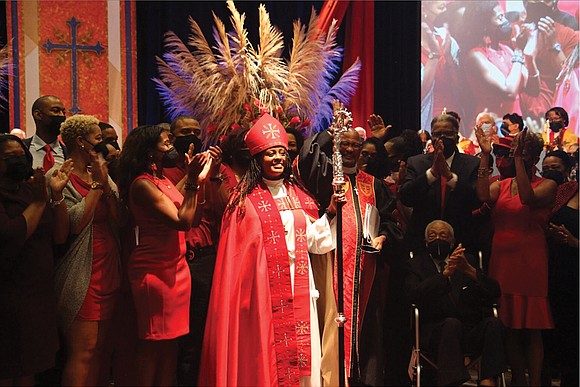Episcopal Diocese of Chicago’s first Black female bishop takes office
Emily McFarlan Miller/Religion News Service | 9/29/2022, 6 p.m.

LoMBArD, Ill. Everyone would have understood if Bishop Paula E. Clark had stepped away from her call to lead the Episcopal Diocese of Chicago, said her fellow bishop, Mariann Edgar Budde of Washington, D.C.
Just weeks before she was set to take office in April 2021, Bishop Clark experienced a brain bleed while exercising. Surgery followed, postponing her consecration to June, then to August, then indefinitely as she worked through speech, physical and occupational therapies.
As Bishop Clark regained her health, her husband, Andrew McLean, was diagnosed with multiple myeloma and died in November.
“Paula never once wavered, not once,” said Bishop Budde in a sermon at the worship service celebrating Clark’s ordination and consecration as bishop on Saturday, Sept. 17, at the Westin Chicago Lombard Hotel in this Chicago suburb.
“Now Paula knows how to let go when that’s what’s best, but she never let go of you, Diocese of Chicago, and she never let go of the call that God placed on her heart and yours.”
Bishop Clark is the first female and first Black bishop to lead the Chicago diocese.
The Sunday after her consecration, she took her seat in the chair, called a cathedra, symbolic of her position, at a worship service at St. James Cathedral in Chicago.
“The process of confirming a new Bishop in the Diocese of Chicago has been long, challenging, sometimes heartbreaking, but always guided by God,” Bishop Clark wrote in a letter of welcome to those who attended her ordination.
“I would like to thank the Episcopal Diocese of Chicago for your steadfast loyalty and faith. You have believed in me, prayed for, comforted, and encouraged me even through difficult times. You have held fast to your faith and showed me what God-centered leadership really is. Most of all, you have kept the faith and overcome, despite repeated setbacks.”
Presiding Bishop Michael Curry, head of the Episcopal Church, served as chief consecrating bishop during the ordination service.
Bishop Curry and the Rev. Anne B. Jolly, president of the Diocese of Chicago’s standing committee, had said repeatedly they expected Bishop Clark to eventually serve as bishop.
Bishop Budde never doubted it, either, she said.
“Being in the presence of Paula Clark and watching her in action is like taking a master class in Christian leadership. That was true before all that transpired in the last 18 months, and it is even more so now,” Bishop Budde said in her sermon.
A native of Washington, D.C., Bishop Clark previously served as canon to the ordinary and chief of staff under Bishop Budde in the Diocese of Washington. She pursued the priesthood after the death of her mother, who did not approve of women’s ordination.
But the Diocese of Chicago, Bishop Clark said after her election, “really captured my heart.” The diocese includes 122 congregations and more than 31,000 baptized members in northern and west-central Illinois.
Bishopo Clark succeeds Bishop Jeffrey D. Lee, who was unable to attend Saturday’s service.
But Bishop Lee recalled Bishopo Clark’s election in December in a statement on the diocese website, saying, “Even as we peered through our Zoom screens at one another, navigating the unfamiliar territory of a virtual bishop election, your sense that she was called to serve with you, that the Holy Spirit was drawing you together, was palpable. It was a joyful occasion.”
Saturday’s service also was full of joy — a quality Bishop Clark brings to everything she does, Bishop Budde said.
The Diamano Dancers and Drummers performed a West African dance called lamba as they processed into the service alongside Episcopal, ecumenical and interfaith clergy from across the Chicago diocese and beyond.
More than 20 clergy followed Bishop Clark from Washington, D.C., where she is “much beloved,” said Canon Anne- Marie Jeffery of the Diocese of Washington.
About 125 members of the Union of Black Episcopalians had come from across the country the night before the ordination for a reception to revel in the church’s celebration of people of color. Even more had arrived Saturday morning, said the Very rev. Kim L. Coleman, president of the Union of Black Episcopalians.
They wanted to show a “tangible representation of our love” for the new bishop as she leads the diocese, where, Coleman pointed out, the Union of Black Episcopalians’ first president, the Rt. Rev. Quintin Ebenezer Primo, Jr., once served as suffragan bishop.
“She (Bishop Clark) overcame and is an example for us, so it’s a very proud moment,” Rev. Coleman said.
Many clergy danced and clapped as they processed, their smiles clear even under face masks.






